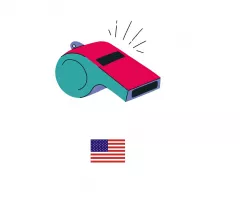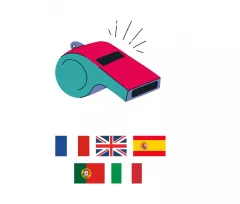Elior Group has set up an outsourced alert system managed by an external and independent service provider that allows employees to report a concern confidentially. The alert system is available to all employess in every country where Elior Group operates.
The Group is eager to promote a culture of dialogue and wants to encourage all employees to read carefully the Whistleblower's Charter and to use the reporting channels at their disposal to voice their concerns if they come accross unethical and/or illegal behavior.
You can use the our whistleblowing system if you are:
- An employee (employees, shareholders, managers and executives) including external and occasional workers (temporary workers, apprentices, trainees);
- A person whose employment relationship with the Elior Group has ended, provided that the information was obtained within the framework of this relationship;
- A person who has applied for a job within Elior Group, provided that the information was obtained in the context of this application;
- The co-contractors of the Group as well as their subcontractors.
- Breach of competition rules (for example: sharing any confidential information with competitors or agreeing on prices with competitors)
- Corruption (for example: offering/receiving sums of money or gifts in exchange of obtaining/granting a contract)
- Influence peddling (for example: paying a third party to use his/her influence with a public authority or administration to obtain an undue advantage)
- Conflict of interest (for example: selecting as a supplier a company in which one of the family members of the decision maker works)
- Money laundering
- Financing of terrorism
- Fraud
- Non-compliance with the rules set out in the Group's Integrity Guide or the Ethics Charter
- Psychological and/or sexual harassment
- Violations of the environment or of human rights and fundamental freedoms.
An acknowledgment of receipt (specifying the date and time of the report), accompanied by a summary of the attachments communicated, will be sent to the whistleblower by the service provider within 7 working days following the report. The service provider will check that the facts reported fall within the scope of the Charter and that they are sufficiently consistent to be subject to in-depth checks.
If the external service provider finds that the facts reported are not admissible, the whistleblower will be informed of the reasons why his or her report does not comply with the required conditions and that, consequently, no action will be taken. The whistleblower will then be directed to alternate internal avenues allowing him or her to address his or her grievances/concerns.
A monthly report will detail all the alerts that were not admissible in an anonymized form and will be sent to the Group Compliance Officer.
Nevertheless, if the report falls within the scope of the Charter and is sufficiently substantiated, the report will be forwarded to the Compliance Department for an in-depth analysis.
No later than three months from the report's acknowledgment of receipt, the whistleblower will be informed by the Compliance Department of the follow-up to be given to the report:
- Either the closing of the investigation when the allegations are inaccurate or unfounded or when the report holds no longer merit; or
- Additional measures are being considered or taken to assess more precisely the accuracy of the allegations and, if necessary, remedy the subject of the report.
In accordance with the law and with the Group's Integrity Guide and the Ethical Principles , there will be no retaliation against whistleblowers.
The whistleblower is protected against any adverse actions following a report, provided that the said report has been made in good faith and that the whistleblower has reasonable grounds to believe the said report was necessary to safeguard the interests in question (the safety and health of employees and guests, protection of the Elior Group's reputation in terms of probity, etc.).
Thus, the Group prohibits all measures of retaliation, threats or attempts to resort to these measures, in particular in the following forms:
- Suspension, layoff, dismissal or equivalent measures;
- Demotion or denial of promotion;
- Reassigning to a less desirable position, change of place of work, reducing or changing pay or hours;
- Suspension of training;
- Negative performance evaluation or work certificate;
-
Imposed or administered disciplinary measures, reprimand or other sanctions, including financial sanction;
-
Coercion, intimidation, harassment or ostracizing;
-
Discrimination, disadvantageous or unfair treatment;
-
Failing to hire;
-
Failure to rehire or early termination of a fixed-term employment contract or a temporary contract;
-
Harm, including damage to reputation, in particular on an online communication service, or financial loss, including loss of business and loss of income;
-
Blacklisting (sector or industry level);
-
Early termination or cancellation of a contract for goods or services;
-
Cancellation of a license or permit;
-
Improper referral to psychiatric or medical treatment.
Important: facilitators (third parties who aid the whistleblower to make a report, such as unions or NGOs) and the relatives and colleagues of the whisleblower are also protected under this Charter and are entitled to the same level of protection as the whistleblower.
The Group guarantees confidential treatment of all information collected through the whistleblowing hotline, which only records the personal data received from the whistleblower or necessary to process the the alert, which is generally as follows:
- The identity, contact details and job title of the whistleblower(s),
- The identity, job title and contact details of the person (s) who aided the whistleblower, if applicable,
- The identity, job title and contact details of the person(s) implicated in the alert,
- The identity, title and contact details of the person(s) questioned during the investigations, when necessary,
- The identity, job title and contact details of the person(s) involved in collecting or processing the alert, when necessary,
- The allegations reported,
- The information gathered as part of the verification of the facts reported,
- The report on the measures taken to investigate and remedy the alert.
Data collected within the European Economic Area will not be transferred to a country outside the European Economic Area unless there is an adequacy decision in place.
The identity of the whistleblower is disclosed within the company, if necessary, only to those who need to know it for the purposes of verifying or processing the alert and its consequences. and only after they have signed a specific confidentiality agreement. Under no circumstances the identity of the whistleblowers is disclosed to the person(s) implicated in the alert.
Save as set out above, any information which is liable to reveal the whistleblower's identity will not be disclosed without his ou her consent, except to the judicial authorities, or to satisfy a legal requirement, once the validity of the alert has been established.
In the same way, the elements likely to identify the person implicated by a report cannot be disclosed, except to the judicial authority or to satisfy a legal requirement, once the validity of the alert has been established.
The data collected is encrypted and stored in an electronic safe hosted by the external service provider. Access to the electronic safe is restricted to the Compliance Department, in their capacity as sole recipient. Only they possess an invidual username and password.
If the whistleblower has made a report directly to a manager or a member of the HR department (or another employee authorized to process an alert), the person having collected the alert is responsible to answering any inquiry relating to the methods of data storage and more generally, to data collection.
The data collected will be retained only for the time required to process the case under investigation and will be destroyed as soon as their conservation no longer appears necessary from a legal point of view (for example, for the duration of a contentious procedure). When possible, the data collected will be stored anonymously. (i.e. by neutralizing the personal data within the retained data).
Furthermore, and in accordance with the General Data Protection Regulations (“GDPR”), every person identified in the whistleblower hotline can access the data concerning him/her and request, if necessary, their rectification or erasure.
They can also object to the processing of which they are subjected but only within the limits of Article 21 of the GDPR (i.e. legitimate and compelling reasons may prevail over the interests and rights and freedoms of the data subject).
Nevertheless, the implicated party may not receive (given limitations on the right of access) information concerning third parties and in particular the identity of the whistleblower.
For any information on the rights related to the protection of personal data, the whistleblower or any person concerned may contact: gdpr-contact@eliorgroup.com.
In accordance with the GDPR, the Compliance Department informs the person implicated by an alert within a reasonable period of time, which should not exceed one month in principle. He indicates to him or she the allegations made, as well as of the procedures for exercising his or her right of access and to rectification.
However, the information of the person in question may only intervene after the adoption of precautionary measures when these prove to be essential, in particular to prevent the destruction of evidence necessary for the processing of the alert.
Furthermore, the information of the person in question does not contain elements relating to the identity of the whistleblower or of third parties. It should be noted that the Group applies the principle of proportionality when enforcing any sanctions.


